This article is all about empowering parents with essential ABA (Applied Behavior Analysis) goals to support their child's growth effectively. We know that navigating this journey can be challenging, but when parents actively engage in the ABA process—through structured training, collaboration with therapists, and implementing measurable goals—they can significantly enhance their child's developmental outcomes. Think about it: improved communication, better social skills, and effective behavioral management are all within reach!
When you take an active role in this process, it not only benefits your child but also creates a stronger bond between you and your little one. Imagine the joy of seeing your child thrive as you work together toward these goals! By embracing the ABA approach, you’re not just a spectator; you’re a vital part of the team. So, let’s explore this together and see how we can make a positive impact on your child’s life. We’re here to help you every step of the way!
Empowering a child’s growth through Applied Behavior Analysis (ABA) therapy is such a transformative journey! It truly requires active parental involvement and clear goals. By aligning their efforts with specific ABA parent goals, caregivers can significantly enhance their child's communication, social skills, and overall behavioral management.
But what strategies can parents adopt to ensure their child's success while navigating the complexities of therapy? 🤔 This article delves into eight essential ABA parent goals that not only foster independence in children but also strengthen the parent-child relationship. Together, we can pave the way for a cooperative and nurturing environment. Let’s explore this together!
Rori Care - ABA Therapy empowers parents to achieve their ABA parent goals by nurturing their children's independence through data-driven strategies and comprehensive caregiver education. Research shows that when parents align their efforts with ABA parent goals, the effectiveness of ABA interventions significantly improves, leading to better outcomes in communication, social skills, and behavioral management. For instance, children whose parents participate in therapy show remarkable progress in social interactions, with an effect size of 0.60, a reduction in maladaptive behaviors, with an effect size of 0.52, and improvements in communication, with an effect size of 0.55.
Successful case studies highlight the transformative impact of interventions guided by ABA parent goals. One study found that children with engaged parents demonstrated lasting improvements in their skills, reinforcing the idea that achieving ABA parent goals is crucial for generalizing and maintaining learned behaviors. By incorporating techniques like Natural Environment Teaching (NET) and Pivotal Response Treatment (PRT) into daily routines, parents can effectively achieve their ABA parent goals in supporting their children's learning and development.
Moreover, advancements in ABA therapy stress the importance of creating structured home environments that encourage motivation and independence. Rori Care provides parents with at least 40 hours of training in ABA methods, equipping them to apply effective strategies, such as functional communication training, which helps children express their needs and supports their ABA parent goals for enhancing overall developmental success. This collaborative approach not only benefits the child but also strengthens the parent-child relationship, which is essential for achieving ABA parent goals and fostering a nurturing environment for growth and learning.
The benefits of support provider training extend beyond skill development; they include enhanced support for the child, informed decision-making, and better behavioral outcomes. Empowered caregivers, guided by ABA parent goals and strategies, can maximize intervention effectiveness and lessen stress within the family dynamic. To further engage in ABA practices, consider exploring training opportunities or resources that can equip you with the skills needed to effectively support your child's development. Let’s explore this together!
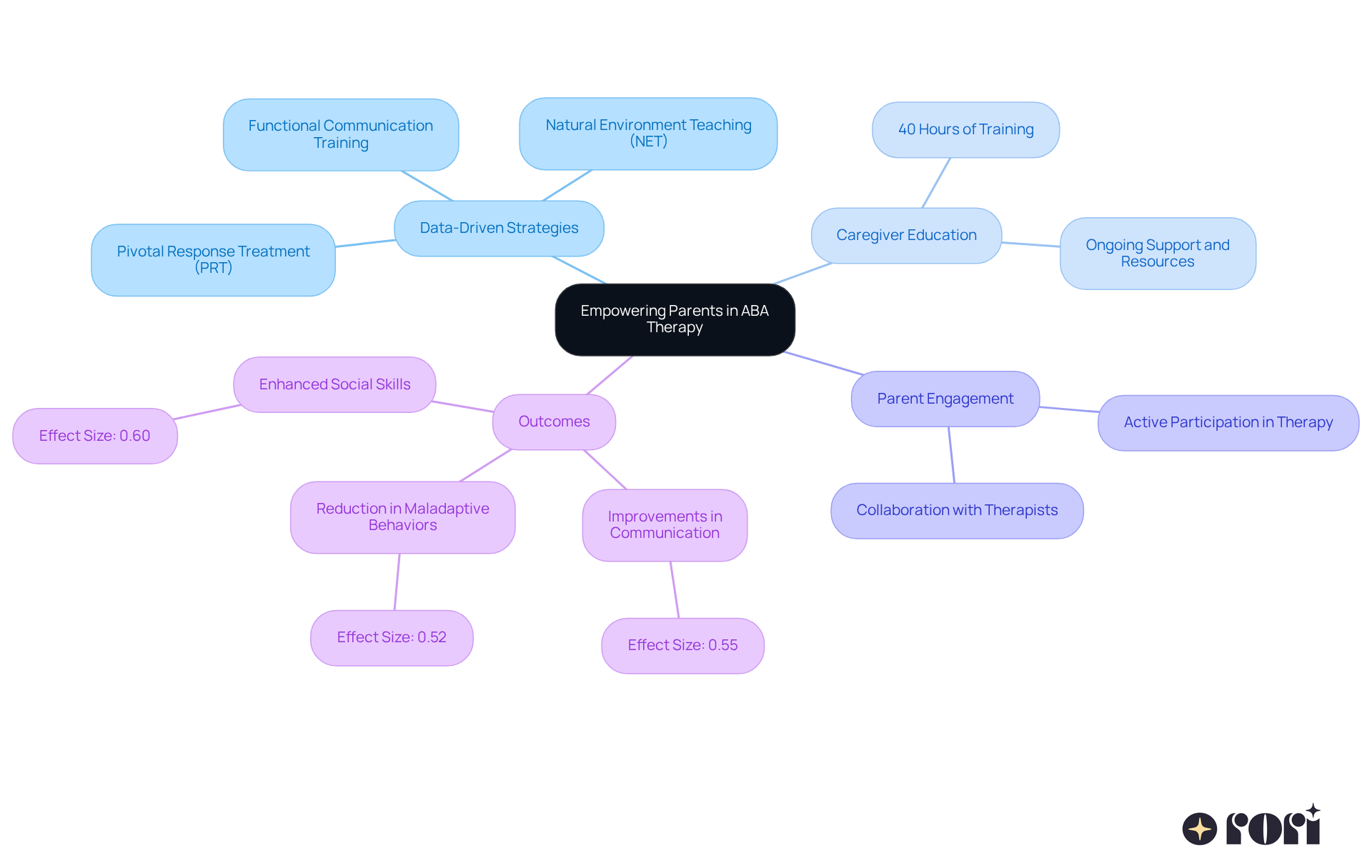
Setting SMART (Specific, Measurable, Achievable, Relevant, Time-bound) objectives is crucial for achieving ABA parent goals in your child's growth during ABA treatment! 🌟 Instead of saying something vague like 'improve communication,' how about a more specific goal like 'increase the use of two-word phrases during playtime within three months'? This clarity not only helps everyone understand the objective but also allows parents and therapists to focus their efforts and see real progress.
Research shows that measurable goals provide a solid framework for assessing how therapy is going. This means you can make timely adjustments to strategies when needed. By collaborating with healthcare providers, parents can ensure these goals reflect their child's unique strengths and challenges, creating a more personalized approach to their development. Plus, tracking adaptive behaviors—like communication, social skills, and self-care—can really enhance your understanding of your child's progress. It makes it easier to celebrate those little victories and spot areas for improvement.
Ultimately, setting clear and measurable goals helps individuals with autism build essential skills and reach their dreams. Let’s explore this together! We’re here to help you every step of the way! 😊
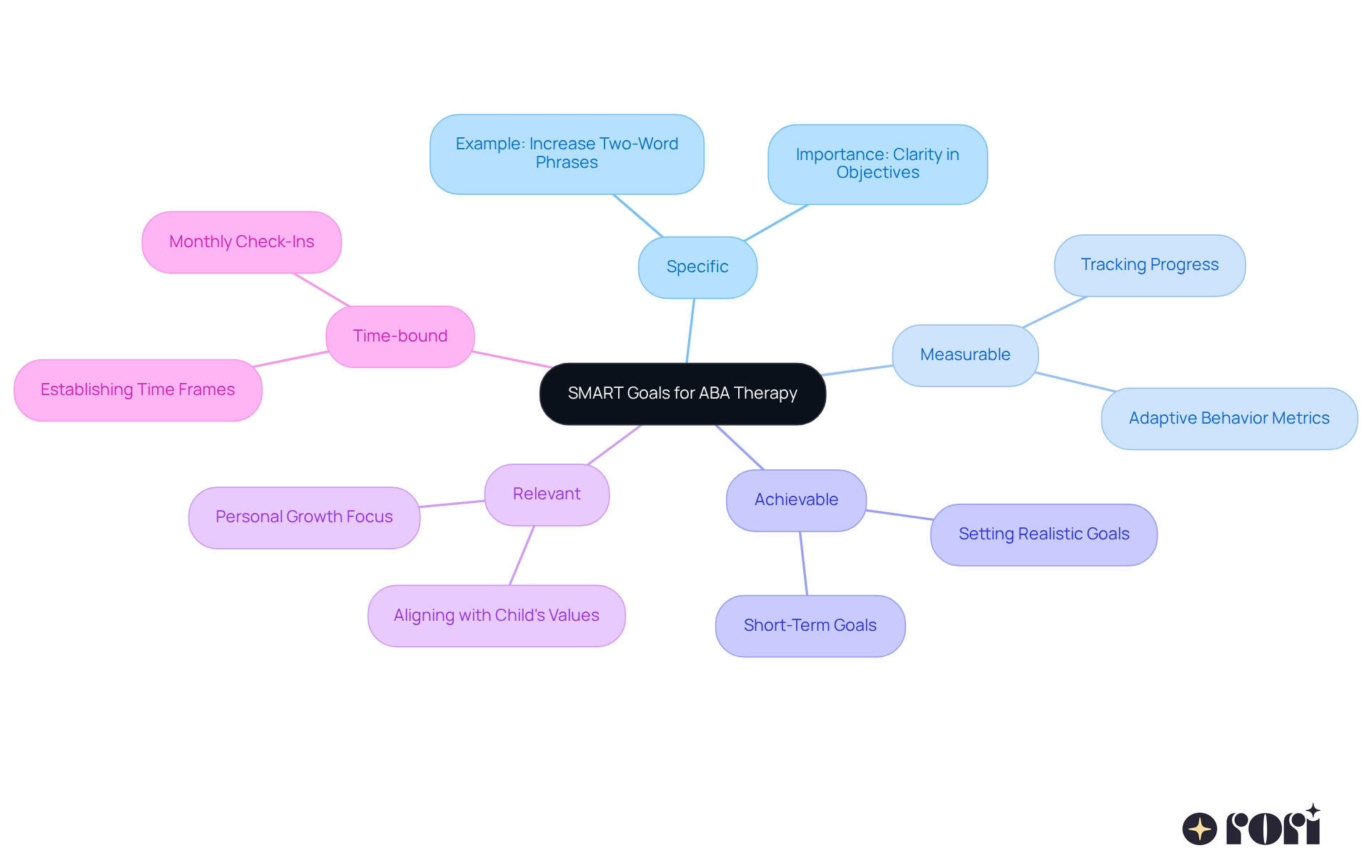
Active parental involvement is crucial in achieving ABA parent goals, and it can really make a difference in treatment results! When parents engage in therapy sessions, practice skills at home, and provide consistent feedback to therapists, they not only reinforce their child’s learning but also nurture a deeper emotional connection. Studies show that kids whose parents are actively involved often see significant improvements in their communication and social skills, like better eye contact and interactions with peers.
But the benefits of parental engagement go beyond just those therapy sessions. Regular encouragement from parents helps children generalize positive behaviors in different environments, ensuring that the skills learned in therapy carry over into daily life. This active involvement leads to lasting developmental benefits, as children who practice skills at home are more likely to use them in community settings.
Additionally, thorough caregiver training not only enhances the child’s skills but also strengthens family unity and supports parental well-being. When parents are involved in behavior management, they create a supportive atmosphere that’s essential for their child’s growth. As parents learn and develop new skills through training, they often feel more confident in supporting their child’s development, which results in healthier family dynamics and improved advocacy abilities. This empowerment is so important—it allows caregivers to make informed choices that positively impact their child’s progress.
In summary, integrating strategies that focus on ABA parent goals within ABA therapy frameworks is vital for maximizing outcomes for children. Current studies back up the effectiveness of these methods, highlighting the need for organized training and open communication between parents and therapists. This collaboration fosters a cooperative and empowering environment for individuals with autism spectrum disorder. Rori Care is dedicated to educating support providers, playing a crucial role in this process, and ensuring that families receive the assistance they need to thrive. Let’s explore this journey together!
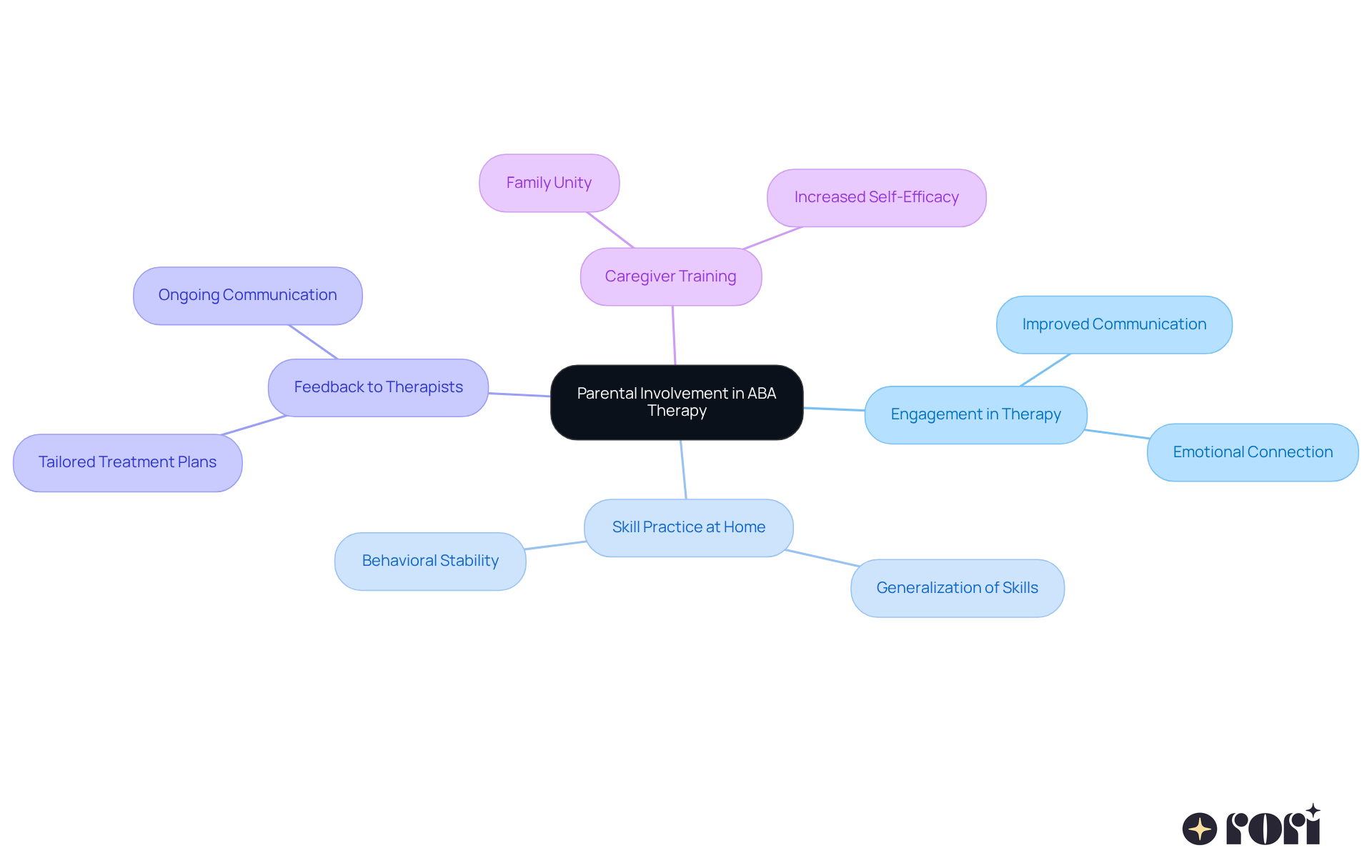
Keeping in touch with your child’s ABA therapist is super important for effective treatment! 😊 Regular check-ins can help you discuss progress, challenges, and any tweaks needed in the treatment plan. This teamwork, along with flexible treatment plans that adjust based on progress, ensures alignment with ABA parent goals.
Did you know that active support from caregivers can significantly contribute to achieving ABA parent goals? In fact, 90% of young individuals show great advancements when suggested hours are fully utilized! By using AI-powered tools that automate progress report creation, caregivers can save up to 50% more time for direct treatment. This extra time can really make a difference in your child’s development. Let’s explore this together and see how we can support each other on this journey!

Implementing positive reinforcement strategies at home can really make a difference in your child's behavior! For instance, think about using:
when they hit specific goals. This can motivate them to engage in the behaviors you want to see. Consistency is key here; applying these strategies regularly helps reinforce learning and encourages positive changes.
When the people supporting your child are actively involved and understand ABA parent goals, they can adapt these strategies based on your child’s progress. This informed approach not only enhances the support they provide but also empowers caregivers, leading to better behavioral outcomes and a more nurturing home environment. Let’s explore this together!
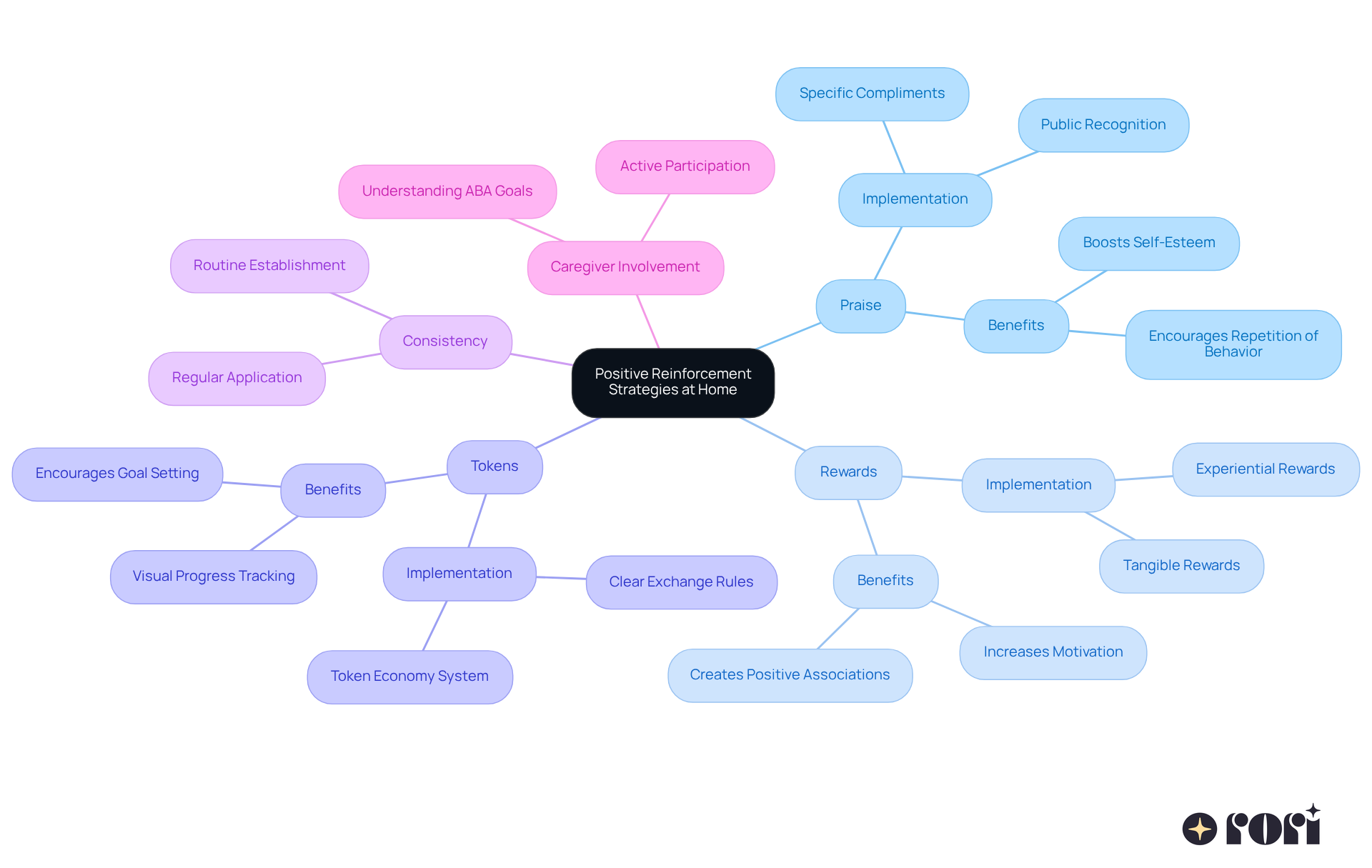
Keeping track of your child's development is essential for getting the best out of ABA treatment. By scheduling regular check-ins, you can see if the current goals are being met and if any changes are needed. This proactive approach not only helps ensure that the treatment stays effective and adapts to your child's growing needs but also supports ABA parent goals by empowering you as a caregiver.
Getting involved in the process, using ABA principles, and taking advantage of AI-driven progress report automation can save you up to 50% more time for your child’s treatment. This means a more personalized and flexible experience, ultimately enhancing learning, communication, and social skills for individuals with autism. Let’s explore this journey together!
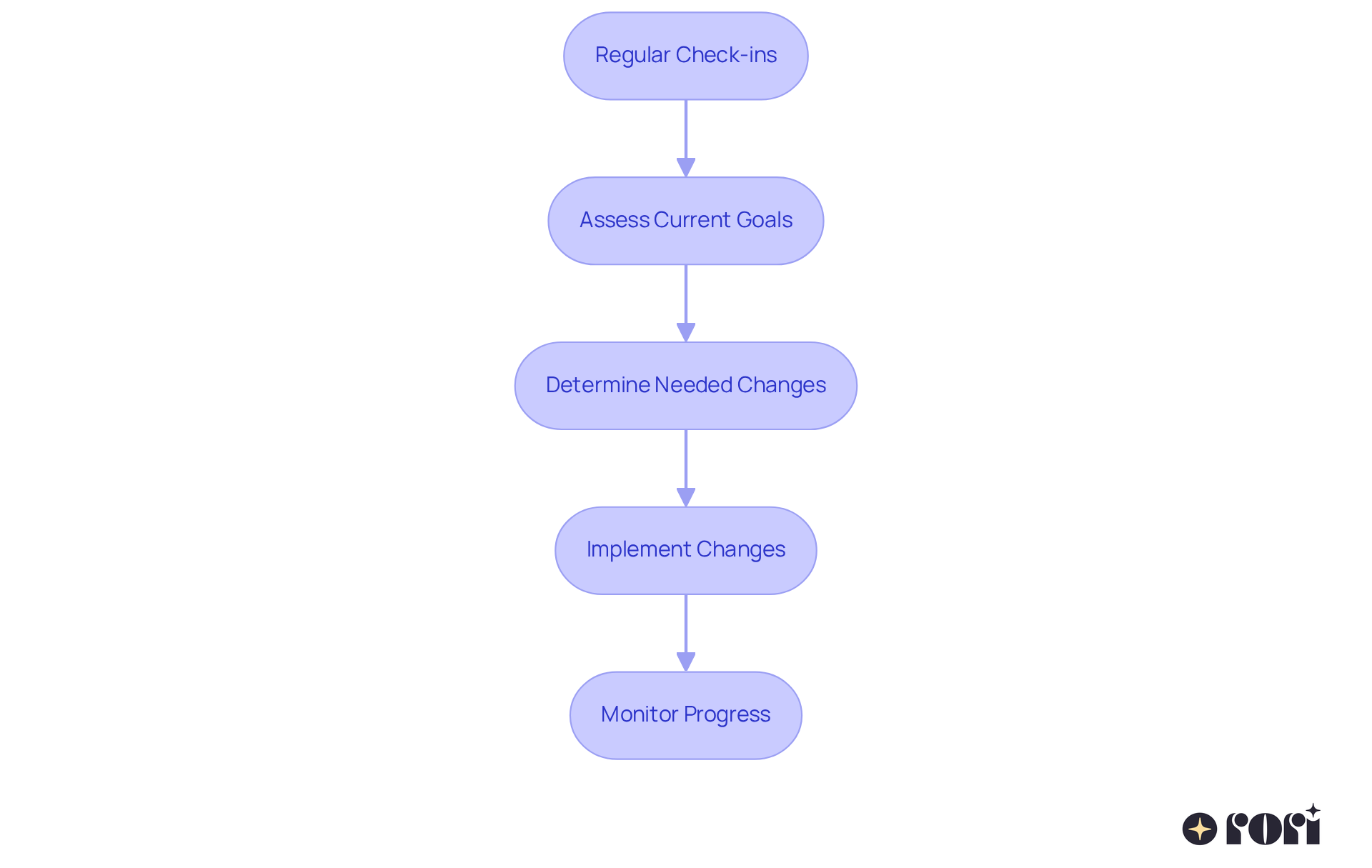
Working together with your child's educators is so important for helping them learn in different environments. By sharing insights from ABA therapy, you can discuss adaptive strategies tailored to your unique needs that can be used in the classroom. This partnership not only promotes a unified strategy but also strengthens you as a guardian, enhancing your ability to support your child's ABA parent goals.
Did you know that 90% of kids show progress when the recommended hours are fully implemented with active caregiver participation? Your involvement in this process helps your child generalize the skills they've learned in therapy to their school setting. This ultimately leads to better behavioral outcomes and a more cohesive support system. Let’s explore this together!
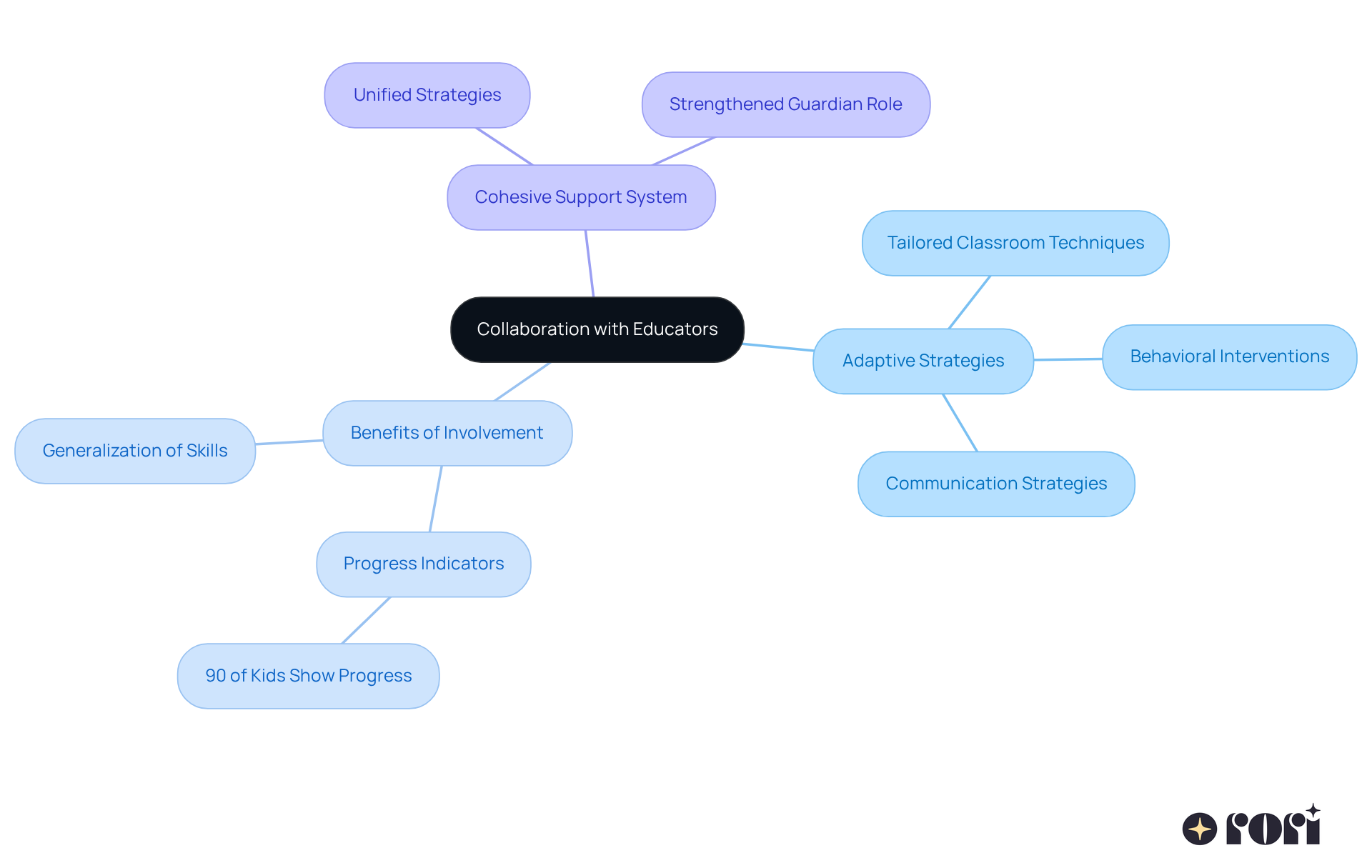
Prioritizing self-care is essential for parents navigating the challenges of supporting a young person with autism. Engaging in activities that boost your well-being—like exercise, hobbies, or catching up with friends—can make a world of difference. Plus, consider taking advantage of Rori Care's complimentary consultations with our Board Certified Behavior Analyst. These sessions can provide valuable insights and strategies tailored just for you.
A healthy, balanced parent, equipped with the right knowledge and support, is better able to achieve their ABA parent goals by offering the encouragement and guidance their child truly needs. Empowering yourself through caregiver education can help you achieve ABA parent goals, as it not only boosts your confidence but also has a positive impact on your child's development. Let’s explore this together! We’re here to help you every step of the way!
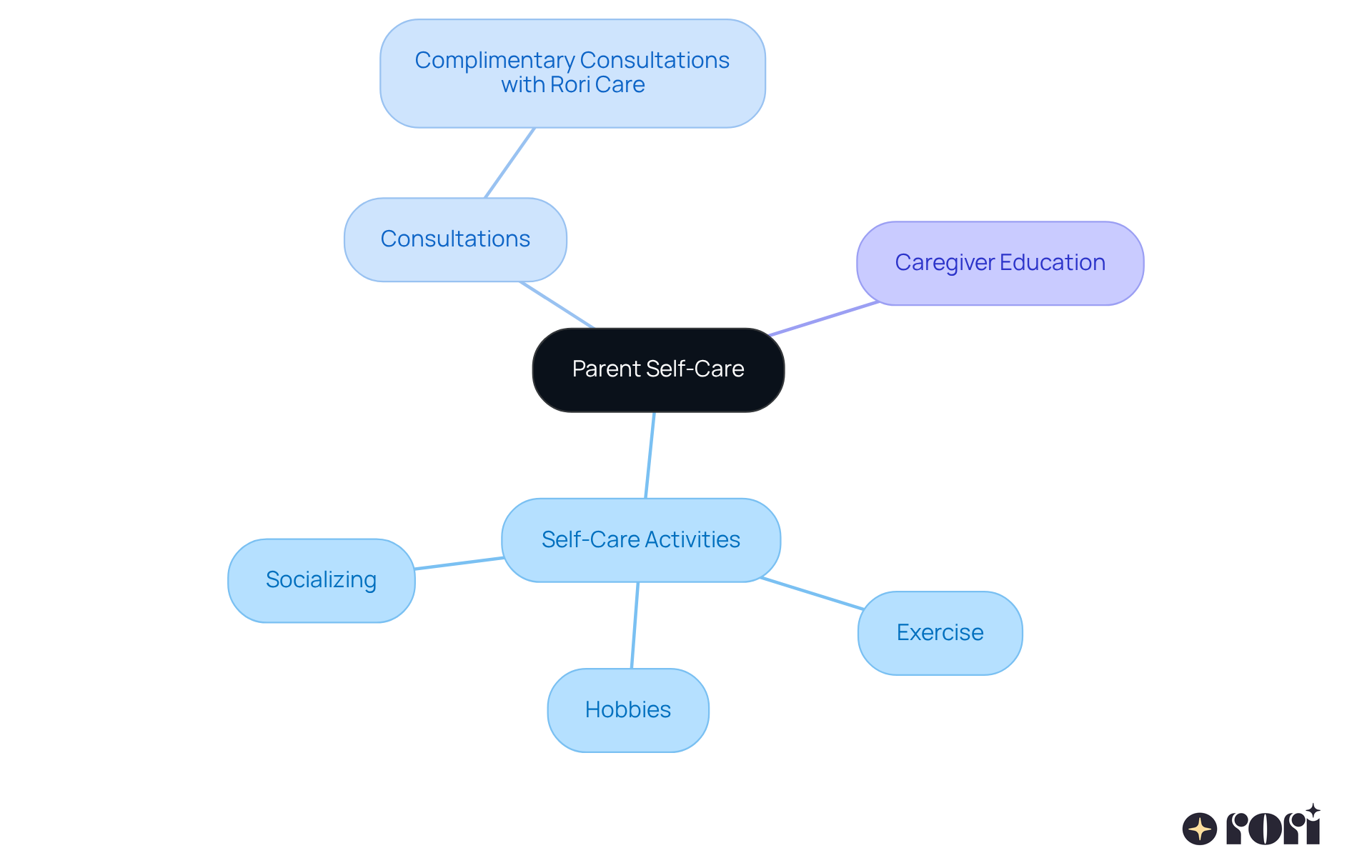
Learning about autism and the importance of ABA parent goals is an ongoing journey that can truly shape your child's growth. By exploring resources like books, articles, and workshops, you can deepen your understanding of ABA principles and strategies. This knowledge not only empowers you to make informed decisions but also enhances your ability to effectively advocate for your child's ABA parent goals.
Getting involved in your child's treatment while aligning with professional strategies can help achieve ABA parent goals, resulting in better behavioral outcomes and more consistent support at home. Plus, understanding the insurance-covered payment options can help you secure up to 100% coverage for ABA services. This means you have the essential resources to support your child's development.
Ultimately, this continuous learning journey helps you improve your child's therapy experience while aligning with ABA parent goals and nurturing their growth. Let’s explore this together and ensure that you’re equipped every step of the way!
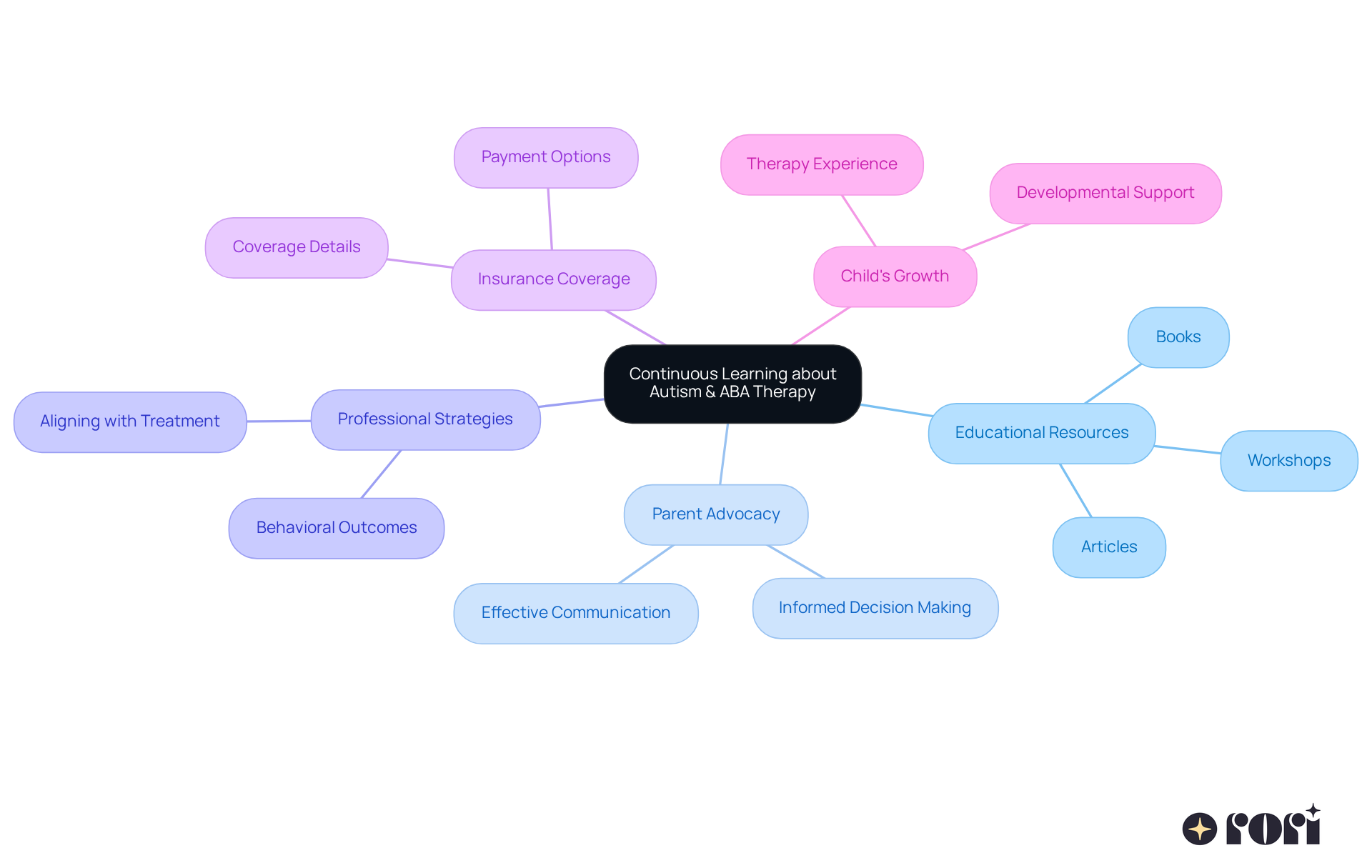
Celebrating your child's successes, no matter how small, is so important for their motivation and self-esteem! 🎉 Creating a reward system for achieving goals can be a wonderful way to provide positive reinforcement. Not only does this encourage continued progress, but it also strengthens the bond between you and your child.
By involving parents in this process and sharing ABA principles and strategies, you can assist them in achieving their ABA parent goals, leading to better behavioral outcomes. This supportive approach at home empowers caregivers to nurture their child's growth effectively. Let’s explore this together and see how we can make a difference!
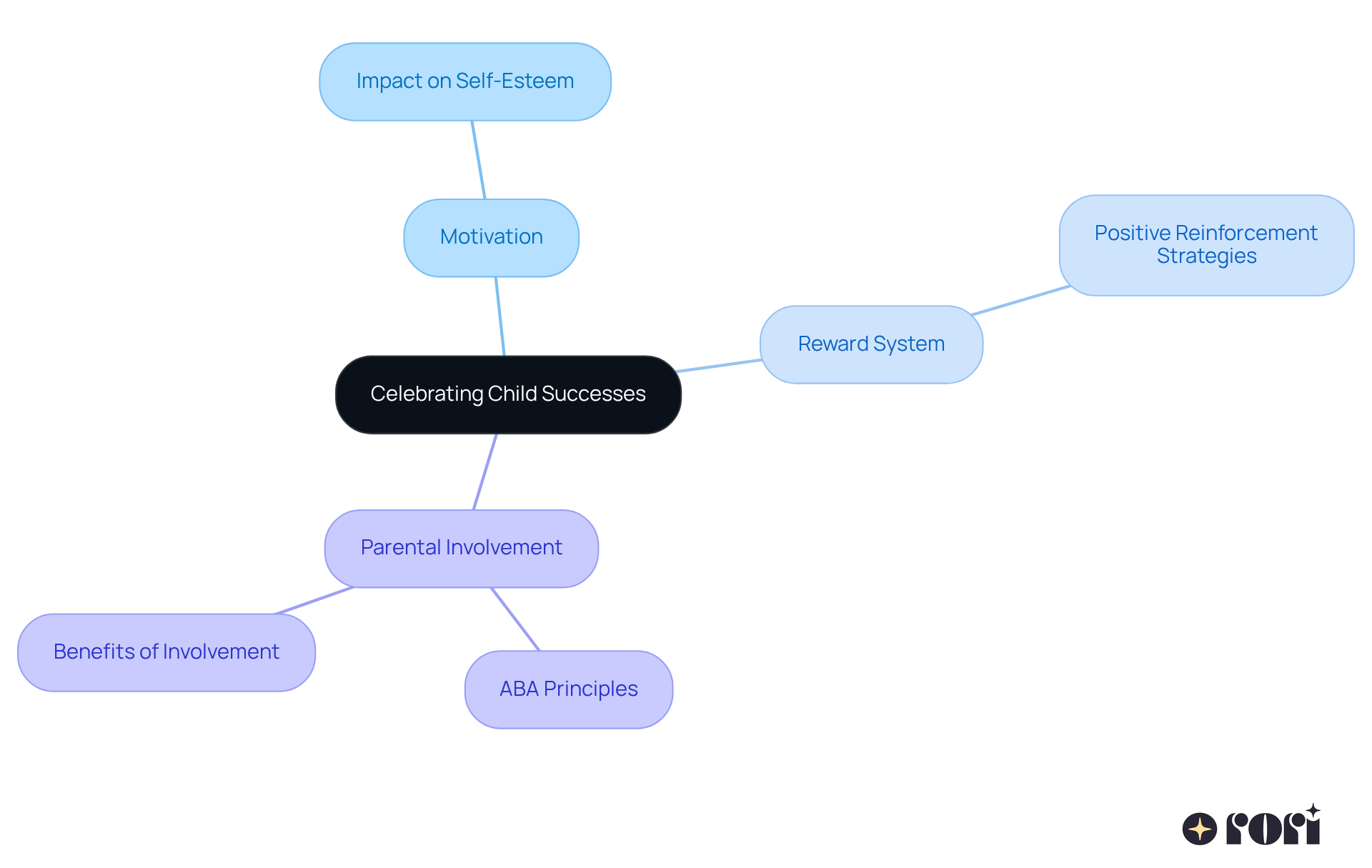
Empowering parents through ABA therapy is so important for fostering independence and promoting meaningful growth in children. When parents align their efforts with ABA goals, families can really enhance their child's communication, social skills, and behavioral management. This collaborative approach not only benefits the child but also strengthens the parent-child relationship, creating a nurturing environment that supports learning and development.
In this article, we’ve highlighted several key strategies to achieve these goals. Think about:
Each of these elements plays a crucial role in maximizing the effectiveness of ABA interventions, helping children generalize their skills across different environments and leading to improved behavioral outcomes.
As we wrap up, remember that supporting a child's development through ABA therapy is a journey filled with commitment from both parents and caregivers. By continuously learning, celebrating successes, and collaborating with educators, parents can create a cohesive support system that empowers their children to thrive. Taking proactive steps to implement these strategies will not only positively impact the child's growth but also enrich the family dynamic. Together, we can pave the way for a brighter future!
What is Rori Care - ABA Therapy?
Rori Care - ABA Therapy empowers parents to achieve their ABA parent goals by nurturing their children's independence through data-driven strategies and comprehensive caregiver education.
How does parental involvement affect ABA therapy outcomes?
Active parental involvement significantly improves therapy results, as engaged parents help reinforce their child’s learning, leading to better communication and social skills.
What are the benefits of setting SMART goals in ABA therapy?
Setting SMART (Specific, Measurable, Achievable, Relevant, Time-bound) goals provides clarity and a framework for assessing therapy progress, allowing for timely adjustments and personalized approaches to a child's development.
What techniques can parents use to support their child's learning in ABA therapy?
Parents can use techniques like Natural Environment Teaching (NET) and Pivotal Response Treatment (PRT) in daily routines to support their child's learning and achieve ABA parent goals.
How does caregiver training benefit families involved in ABA therapy?
Caregiver training enhances skill development, supports informed decision-making, and leads to better behavioral outcomes, ultimately strengthening family dynamics and reducing stress.
What role does the home environment play in a child's ABA therapy?
Creating a structured home environment encourages motivation and independence, which is essential for achieving ABA parent goals and fostering a nurturing atmosphere for growth.
How can parents track their child's progress in ABA therapy?
Parents can track adaptive behaviors, such as communication, social skills, and self-care, which enhances their understanding of their child's progress and helps identify areas for improvement.
What is the importance of collaboration between parents and therapists?
Collaboration ensures that goals reflect the child's unique strengths and challenges, fostering a cooperative environment that maximizes therapy outcomes and supports the child's development.
How does Rori Care support families in their ABA therapy journey?
Rori Care provides education and training for support providers, ensuring families receive the assistance they need to thrive and achieve their ABA parent goals.